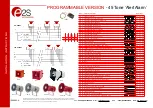
Chapter 7
RAPID!
RAPID! syntax
4460 GSM System Option and 4468 EDGE System Option
Version 12.20
273
How to use operators
– Numeric expressions may use any operator.
– Boolean expressions, which are in fact numbers (0 or 1), may use any oper-
ator.
– String expressions may use all comparison operators and the arithmetic
addition.
Example:
"Willtek " + "4400" will result in the string expression "Willtek
4400".
Expressions
An expression is a valid combination of variables, constants, function calls and
operators.
Basically, there are three types of expressions:
– numeric expressions
– string expressions
– boolean expressions
+
3
Addition
-
3
Subtraction
Comparison opera-
tors
=
4
Equality
<>
4
Inequality
<
4
Less
>
4
Greater
<=
4
Less or equal
>=
4
Equal or greater
Boolean operators
AND
5
Logical AND
OR
5
Logical OR
XOR
5
Logical XOR
NOTE
In case of an integer division or a modulo division, the two operands are first
converted into integer values, before the operation is performed. This means,
that the operands will be rounded before any operation takes place. The
rounding procedure will follow usual ‘commercial’ rules.
Example:
The result of (5 MOD 2.3) will be 1 as it is interpreted as (5 MOD 2)
by RAPID!.
NOTE
Regardless of the format of the operands with comparison operators, the
result will always be a boolean value, i.e. number 0|1.
















































